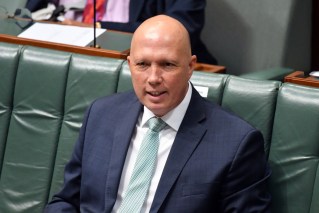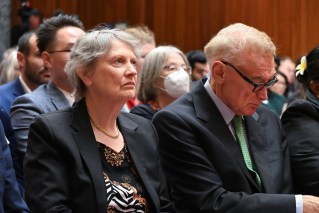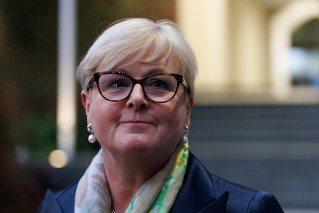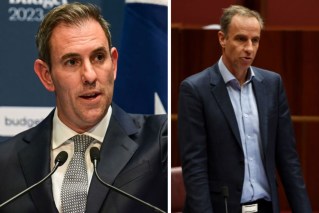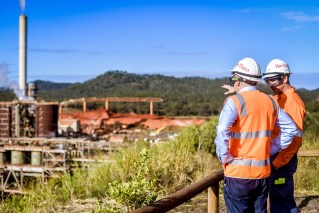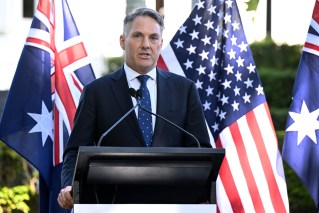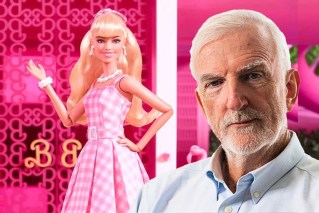‘A Liberal Party ad?’: Taxpayers foot the bill for pre-election campaign

A taxpayer-funded advertisement singing the virtues of the Australian economy is again drawing attention to the use of government advertising before Australian elections.
The Opposition has decried the latest round of ads extolling the government’s economic plan, saying they are indistinguishable from a Liberal Party campaign.
“Does that look like a Liberal Party ad to you?” Senator Katy Gallagher asked this week in an upper house inquiry.
“When I opened the paper, I thought that was a Liberal Party ad; it’s the same colour.
“It looks very similar to the ones [they are] going to be running.”
Senator Gallagher was holding a copy of advertisements widely placed in newspapers across the country for the past month titled ‘Australia’s economic plan’.
Authorised by Treasury, the ads are designed to promote the message the nation’s economy is growing healthily after the contraction of the pandemic.
“Australia performed better than major advanced economies through the pandemic,” a video spot for the same campaign says.
“The Australian government’s economic plan is helping.”
But the message dovetails extremely closely with that which Prime Minister Scott Morrison is seeking to prosecute before he calls the election in coming days.
The government has been falling in behind the use of the phrase “our economic plan” since at least last year.
At one brief campaign stop north of Sydney on Wednesday, Mr Morrison found five opportunities to use the phrase.
That has led to accusations from Labor that the Prime Minister’s apparent hesitation to visit the Governor-General and call an election is designed to reap the maximum benefit from government advertising.
That delay may owe more to the internal squabbles dogging the Prime Minister, including over Liberal Party preselections.
The High Court agreed on Wednesday evening to a hearing on Thursday to discuss an urgent application to appeal against a decision by a NSW court.
The court’s decision has given Mr Morrison the right to take over the state party and install his own candidates.
But the $1 million a week that taxpayers are spending to fund the advertising campaign has brought the issue of the allegedly partisan flavour of public advertising into focus again.
Tweet from @SenKatyG
University of Western Australia Professor David Denemark, an expert in political advertising, says such advertising is one of the chief benefits held by an incumbent government before a campaign begins, and its use is little regulated.
“There’s inevitably a pretty blurred line,” he tells The New Daily, regarding not just the national-level campaigns, but the printed material from MPs that is likely to have made its way through voters’ mailboxes in the past few weeks.
“If you were to say almost identical things as the opposition candidate, then you’d have to pay for the brochure and for the people who designed it, and for the postage costs and all the rest.”
It’s an advantage that governments of both stripes have availed themselves of courtesy of the taxpayer when headed into an election.
Only once the election is called do caretaker provisions kick in, prompting a freeze in advertising.
Scott Morrison, when an opposition frontbencher, decried the Rudd government’s use of the tactic as an outrage.
Liberal Party pre-election campaigns, such as on Work Choices and the tens of millions of dollars spent on ads promoting the GST – set to the Joe Cocker song Unchain My Heart – have also come in for a kicking.
Some states, such as New South Wales, have strict rules restricting government advertising before an election.
“It’s echoing the game we’re about to see, which is that [the government] emphasises the good and sidesteps the bad,” Professor Denemark said of the pre-election advertisements.
And there are calls for a similarly tough approach to regulation federally.
The government spent more than $145 million on ad campaigns of some nature last financial year, including on those promoting COVID-19 rules, but also the Coalition’s criticised approach to cutting carbon emissions.
“Australians would be shocked to learn they are footing the bill for a government advertising budget which dwarfs that of companies like Coles, Woolworths and McDonald’s,” said Bill Browne of the Australia Institute, who is calling for tougher oversight by independent bodies.
“The current rules have failed to prevent dubious and controversial advertising campaigns from being funded, at a cost of millions of dollars of public money.”
Mr Browne cites polling showing that three-quarters of Australians back a proposal to have the Auditor-General review the information content of the spots.
But as Senator Simon Birmingham told the upper house inquiry this week, the use of such advertising is far from uncommon.
Besides, he said, of the Treasury’s campaign: “Aside literally from the fact that […] it’s not even the same shade of blue in campaign material it otherwise looks quite clearly like a government ad.”

